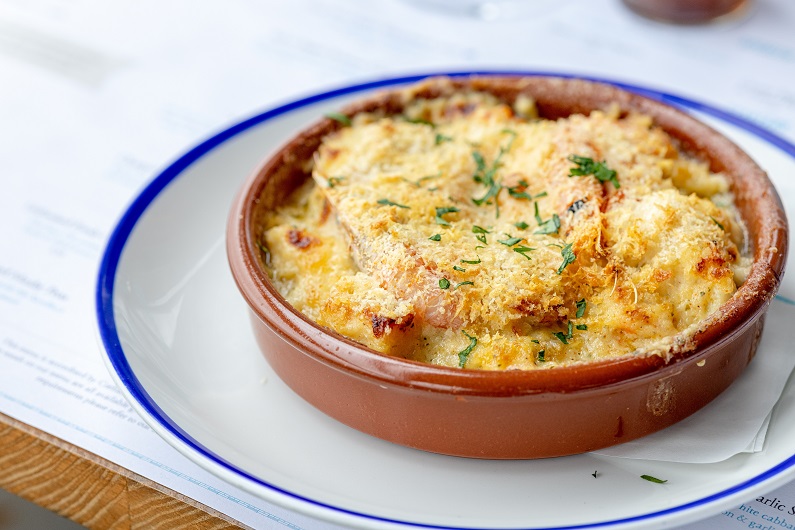
After hours in the canteen

I’m on the balcony overlooking Latymer Upper School’s playing fields, chatting to the owner of School Kitchens, David Nicholson. There’s a field with a school rugby team below, and the ‘Feel Good Funk’ Spotify mix faintly playing from the crackly speakers inside—it’s an undoubtedly posh atmosphere, but the aspirations of the organisation perhaps redeem it.
Let me give a bit of backstory: School Kitchens had reached out a while back about a PR opportunity. Already established in York as a sustainable, community-based takeaway service, the organisation was opening their first in-person restaurant in Latymer Upper. The organisation rents school kitchens after hours, and before this branch, had run a delivery service catering to the local community.
While the York branch offered a range of international cuisines, with recipes written by seven global celebrity chefs, the Chiswick kitchen’s launch focused on reinterpretations of classic British school canteen food.
The premise was something of a source for scepticism, because a) the British have never been famed for their cuisine, and British school canteens even less so; and b) as an international student from Australia, I am woefully ill-versed in the intricacies of British delicacies. Not to worry: I had dragged two friends—born, raised, and educated in Britain—along with me as my cultural experts, and the food turned out to be… not bad.
A word of moderation is needed here: ‘not bad’ is far from ‘exceptional’. The lamb meatball, with a rich mushroom sauce as accompaniment, was probably the best of the lot. The fish pie had mash potato neatly pipetted around it – while I’ve never been a fan of fish pies, one of these British friends described it as “the best school fish pie I’ve ever had”. The toad in the hole had a somewhat flaky Yorkshire pudding batter, and the crême brulée had a, let’s say, intriguing custard replacement that was a mix of rice grains and whole cardamom pods. All of these were served as starters in tiny white bowls with disposable cutlery, which you had to obtain from trays by fighting off a horde of other guests; by the time the main was being offered, I was famished.
And the main held promise: two giant woks of paella, cooked on flaming butane tanks. I hate to be critical of this good-hearted organisation, but it did fall a bit flat on its promise. The rice was ever so slightly overcooked. The toppings were ever so slightly under-seasoned. It wasn’t quite as flavourful as traditional Spanish paella, or even as the paella served by street vendors back in Australia but was still a worthy effort to introduce a new dish to the British palate.
This concept of introducing customers to different cuisines, in what is quaintly called a ‘field trip’, is one of the core ideas behind School Kitchens—expanding people’s culinary horizons by engaging them with the diversity in their community. David tells me about the genesis of the premise: “Dark kitchens are on the rise—these places where food gets ordered, made, and delivered, without there ever being any interaction between the kitchen and its customers. I thought, ‘What if we could turn this on its head?’”
Having worked at Tesco and Amazon, super-companies which specialise in distancing maker and consumer, David wanted to emphasise something which was grounded in the local area. While talking with him, I was impressed by how holistic School Kitchen’s community-based model was. They operate on a shared revenue model, giving a part of earnings back to the school that owns whichever kitchen they used. They fund breakfast clubs, giving kids free breakfasts in the local area. They train employees in food delivery and have a fully internal delivery system. They don’t employ anyone on unstable, fixed-term contracts. They even have a circular system for packages in Yorkshire, where home-based or council-run composting isn’t as widely offered, which allows customers to send back their containers to be composted.
When asked what the most challenging part of launching School Kitchens was, David answered: “It’s about getting the word out there. People’s patterns of consumption are hard to change, but they can, and they do.” The fact that School Kitchens had succeeded in its launch shows that this kind of change is possible. In fact, they’re gaining traction, with at least five other schools reaching out about collaborating with School Kitchens.
If you’re looking for a fine dining experience, this might not be the place for you. But if you’re looking for hearty food or a hit of nostalgia and want to find the most ethical sources of consumption that you can, keep an eye out for when a School Kitchens branch opens in your area.∎
Words by Faye Chang. Image courtesy of School Kitchens.







